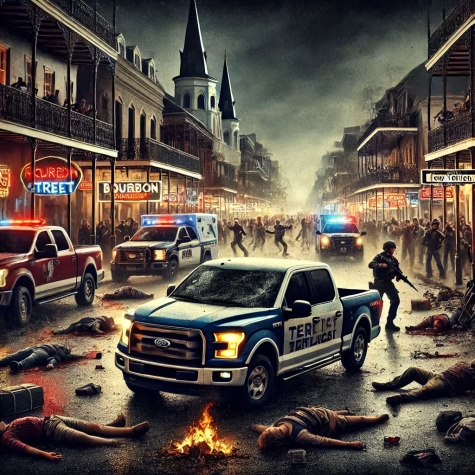[Editor’s note: this version of the story includes a link to a story of known terrorists who have come over the US border, better explaining the connection of this event to border concerns.]
On the morning of January 1, 2025, New Orleans was struck by a devastating act of terrorism as a rented Ford pickup truck plowed into a crowd of New Year’s revelers on Bourbon Street, killing at least 10 and injuring dozens more. The suspect, identified as Shamsud Din Jabbar, attempted to wreak havoc by mowing down pedestrians over a three-block stretch before getting out of the truck and opening fire on responding officers. Police shot and killed Jabbar, but the destruction he caused left the city in shock.
There is suspicion that the attacker did not act alone:
Breaking: FBI Now Says New Orleans Terrorist Truck Attacker Shamsud Din Jabbar Did Not Act Alone!
Breaking News and Reports Here:https://t.co/gcn9cZwFk9 pic.twitter.com/fvdEdfweFC
— Alex Jones (@RealAlexJones) January 1, 2025
This event has raised the discussion about the potential increase in terrorist attacks in the country.
Make sure to read this article about the number of known Terrorists who have come over the border:
Suspected Terrorists Illegally Entering US Up Over 2,500% Under Biden From Trump Era
This horrific attack on Tuesday, now being investigated as an act of terror, has sent ripples across the country. Jabbar’s actions, along with the discovery of improvised explosive devices (IEDs) at the scene, suggest a highly coordinated attack. Law enforcement is scrambling to understand how this attack was planned and whether Jabbar acted alone or had accomplices.
Ben Bergquam, in his fiery reaction to the incident, expressed the growing fear surrounding open borders and the potential for future attacks like this one due to the increase in the number of known terrorists who have come in over the border.
The attack comes amidst rising concerns about vehicle ramming attacks, a tactic increasingly used by terrorists to target crowded events. The FBI had already issued warnings about such incidents during the holiday season, and this attack underscored those fears. Authorities are now looking into whether the suspect had ties to international terrorist groups like ISIS, and whether anyone connected came into the U.S. through the country’s porous borders.
The New Orleans attack comes on the heels of another terror incident in Germany just days earlier, illustrating the global nature of this threat. Police and local authorities in New Orleans acted quickly, but the scale of the attack and the extent of the injuries reflect the urgency of addressing these types of threats.
Bergquam’s response reflects the anger and frustration that many Americans feel about the state of national security. As the investigation unfolds, questions continue to swirl around the security of the U.S. borders as it relates to a terrorist attack and the government’s role in protecting citizens from such acts of terror. His call for action to “Close the Border” and hold those responsible accountable strikes a chord with those who believe the country’s lax immigration policies are making it vulnerable to attacks like this.
As the investigation continues, the U.S. faces the challenge of not only addressing the immediate threat posed by individuals like Jabbar.
But also examining broader policies that may contribute to the rising wave of terrorism within its borders. The New Orleans attack serves as a sobering reminder that terrorist threats remain a pressing concern for the country, especially in light of open borders and rising extremist activity.
